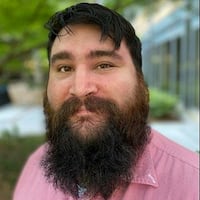Atlanta native Beka Ramsey is 1 in 10,000. Those are the odds someone will be diagnosed with the rare, often life threatening disease called heterotaxy syndrome.
Identified in utero, she had a hole in her heart and a rare defect that caused two of her major arteries to connect to the same ventricle. The syndrome accounts for only 3% of congenital heart disease cases, but Ramsey was one of them. It was a serious medical problem in need of a swift remedy.
The prognosis for the syndrome is often dire, and many newborns don’t survive beyond their first year. Ramsey, however, is going strong at 29.
“I have been so grateful that I only required surgery as an infant, followed by 27 years without any interventions,” she wrote to The Atlanta Journal-Constitution. “I grew up going to what is now Children’s Heart Center annually for checkups so they could follow my aortic aneurysm from an early age. I had to generally be careful during exercise because I didn’t want the aneurysm to rupture (although that didn’t stop me from becoming a Barre instructor a few years ago). I also had to be careful what medications and supplements I took because my heart was very sensitive, and simple OTC medications could cause weird rhythms.”
Children’s Healthcare of Atlanta Egleston Hospital performed two surgeries to save her, the first being when she was just six days old. Almost seven years ago, however, Ramsey returned to Children’s — just not as a patient.
“As a clinical level four nurse in the NICU at Children’s, I care for the sickest, tiniest warriors,” she said, detailing her nursing career. “The NICU at Arthur M. Blank Hospital is the only Level IV NICU in the state of Georgia, verified by the Georgia Department of Public Health (DPH) and American Academy of Pediatrics (AAP), meaning we care for the sickest patients, including surgical patients and those on ECMO and CRRT. (Continuous renal replacement therapy is a special type of dialysis treatment used to support the kidneys of critically ill children.)”
Ramsey began her career at the same Egleston Hospital that saved her life, before moving to the Arthur M. Blank Hospital that replaced it. As a nurse, she now treats newborns in critical need of care, including those rare few suffering from heterotaxy syndrome.
“I have cared for these critical patients for about three years now,” she added. “I also am a resource nurse, meaning I am somewhat of a leader on the unit and help with admissions, traveling, surgeries, IVs, codes, making assignments, etc. Additionally, I sign up to be a patient’s primary nurse when I can. This means I am assigned to care for that patient every time I am on shift. Being a primary enhances the consistency of care and allows a nurse to be an advocate for their patient, since they know them better than anyone else. I love being able to bond with the patient and their parents in this way.”
Last year, the Atlanta native needed to go under the knife once again. An aortic aneurysm and leaking aortic valve meant she was going to need a pacemaker and a valve replacement.
“I still must be careful with medications, but now I don’t have to worry about my heart rate dropping too low,” she explained. “The challenge I face now is that the artificial valve I received will need to be replaced at some point in the future. They usually last about 10-20 years. I chose an artificial valve over a mechanical one because it will be easier and safer for me to get pregnant when I am ready.
“In addition to the heart condition, heterotaxy affects other organs as well. For example, I have malrotated intestines, a birth defect that occurs when the intestines don’t form properly in the abdomen, potentially causing the intestines to twist or become blocked. This has led to some intestinal issues over the years. I also have polysplenia (multiple spleens), which weakens my immune system some. Because heterotaxy causes things to mirror within my body, I have two left lungs and two left sides of my heart. I have extra veins that don’t all go where they are supposed to, but it works out in the end!”
With those surgeries now behind her, Ramsey’s not slowing down. It’s back to beating the odds.
“My patients inspire me daily,” she wrote. “Nursing is a difficult career, full of lots of ups and downs — it’s not for the faint of heart — but my NICU babies make it all worth it. I wouldn’t be in this field without them. I know how scary it is to be a patient. I want to let my patients and families know that there is hope on the other side of it. Even if things don’t always go as planned, they will make it through this difficult time.”
Find more stories like this one on our Pulse Facebook page.
About the Author
The Latest
Featured

